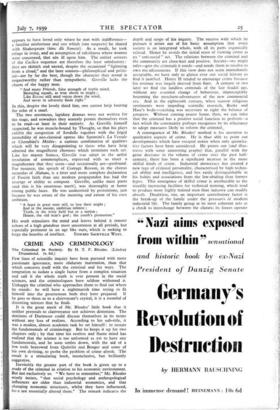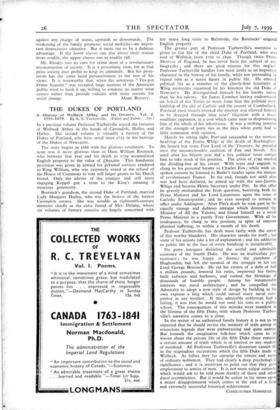CRIME AND CRIMINOLOGY
FEW lines of scientific inquiry have been pursued with more passionate ignorance, more obdurate inattention, than that which concerns itself with the criminal and his ways. The temptation to isolate a single factor from a complex situation and call it the whole truth is ever present in the social sciences, and the criminologues have seldom withstood it. Unhappy the criminal who approaches them to find out where he stands : he will have a nightmarish time trying to fit himself into the procrustean beds they have prepared. If he goes to them as to a clairvoyant's crystal, it is a roomful of distorting mirrors that he finds.
It is the great merit of Mr. Rhodes' little book that it neither pretends to clairvoyance nor achieves distortion. The denizens of Dartmoor could discuss themselves in its terms without any loss of realism. According to his sub-title, it was a modest, almost academic task he set himself : to restate the fundamentals of criminology. But he keeps it up for two chapters only ; by that time his restless and fluent mind has realised that the science is too unformed as yet to have any fundamentals, and he soon settles down, with the aid of a few tools borrowed from Quitelet and Bonger and some of his own devising, to probe the problem of crime afresh. The result is a stimulating book, inconclusive, but brilliantly suggestive.
Inevitably the greater part of the book is given up to a study of the criminal in relation to his economic environment. But not exclusively so. " We have to remember," Mr. Rhodes wisely insists, " that social psychology and anthropological influences are older than industrial economics, and that changing economic structures, whilst they have influenced, ha-:e not essentially altered them." The remark indicates the
depth and scope of his inquiry. The success with which he pursues it arises out of his basic assumption that every society is an integrated whole, with all its parts organically related. Hence he avoids the initial error of viewing crime as an " anti-social " act. The relations between the criminal and the community are close-knit and positive. Society—we might infer—gets the criminals it needs—and needs them to resolve its own ma:adjustments. If this view does not seem immediately acceptable, we have only to glance over our social history to find it justified. Henry II tended to encourage crime because his revenue was largely derived from fines. A century or two later we find the landless criminals of the late feudal age, without any essential change of behaviour, imperceptibly becoming the merchant-adventurers of the new commercial era. And in the eighteenth century, when narrow religious sentiments were impeding scientific research, Burke and Hare's bcdy-snatching was necessary to right the balance of progress. Without coming nearer home, then, we can infer that the criminal has a positive social function to perform—a fact which the community perhaps recognises by its reluctance to adopt measures likely to reform the criminal.
A consequence of Mr. Rhodes' method is his attention to qualitative aspects of crime. He is thus able to point out developments which have escaped notice when only quantita- tive factors have been considered. He points out (and illus- trates with some interesting graphs) that, parallel with the great decrease in the volume of crime over the past half- century, there has been a significant increase in the more skilful kinds of crime. Industrial democracy has created a new type of criminal personality, characterised by high techni- cal ability and intelligence, and less easily distinguishable in his habits and associations from the law-abiding than former types. This emergence of skilful crime is attributable to the steadily increasing facilities for technical training, which tend to produce more highly trained men than industry can readily absorb. Doubtless, too, an important contributory factor is the break-up of the family under the pressures of modern industrial life. The family group at its most coherent acts as a check to interchange between the classes; its forces operate
against any change of status, upwards or downwards. The weakening of the family promotes social mobility—an impor- tant democrative objective. But it turns out to be a dubious advantage. If the lower classes can rise above their station more readily, the upper classes can as readily fall.
Mr. Rhodes sees no cure for crime short of a revolutionary reconstruction of society. It is a pessimistic view, for at that price society may prefer to keep its criminals. But his pessi- mism has the same lucid persuasiveness as the rest of his views. It is noteworthy that, when the notorious " Tea-pot Dome Scandal " was revealed, large sections of the American public tried to hush it up, willing to condone no matter what crimes rather than provide radicals with more reasons for











































 Previous page
Previous page